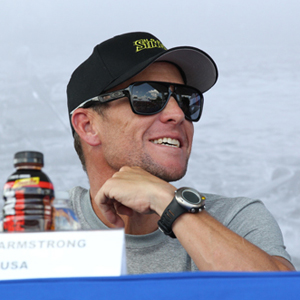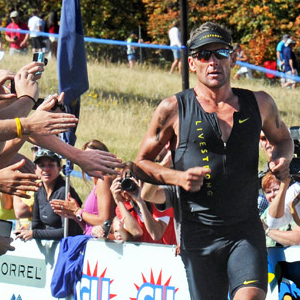Analysis of Armstrong’s Case

On July 10, 2012, Lance Armstrong filed a 25 page Amended Complaint in the Western District of Texas against the United States Anti Doping Agency ("USADA") and Travis Tygart. While Armstrong requested "temporary, preliminary and permanent injunctive relief" against USADA, they have not yet filed an amended motion for a temporary restraining order that would prevent USADA from requiring that Armstrong either accept penalties or initiate arbitration by July 14, 2012.
Armstrong's Amended Complaint has four counts that fall into two general categories. Counts 1 and 2 (Declaratory Judgment and Tortious Interference with Contract) are contract claims relating to Armstrong's relationship with the Union Cycliste Internationale ("UCI"). Counts 3 and 4 (Fifth Amendment Procedural Due Process and Common Law Due Process) address USADA's arbitration procedures.
Contract Claims
Armstrong's contract claims stem from the fact that while he participated in professional cycling events he obtained an annual professional license from UCI. This license was a contract between UCI and Armstrong and contained provisions governing procedures for what happens when a cyclist is alleged to have violated UCI’s anti-doping polices. Armstrong argues that USADA did not sign the annual contracts between UCI and Armstrong (in fact USADA was not formed until 2000, well after Armstrong began his professional cycling career) and that under UCI's policies, UCI cannot delegate or assign its contractual rights to USADA unless UCI independently determines that a violation of its anti-doping polices occurred. Because USADA was not a party to the agreements between Armstrong and UCI, UCI alone has jurisdiction to bring any claims for alleged violation of anti-doping policies against Armstrong.
In connection with his contract claims, Armstrong seeks a declaration from the Federal Court stating that USADA lacks jurisdiction to bring charges against Armstrong and prohibiting USADA from taking any other actions "in furtherance of pursuing doping charges, imposing sanctions or taking any action with respect to disqualification of competitive results, awards, titles, medals, or prizes held by Mr. Armstrong."
While Armstrong did not attach any of the contracts in question to the Amended Complaint, on its face it appears that Armstrong has a fairly strong contractual argument.
USADA will likely have two responses to his contract claims. First, that the Olympic and Amateur Sports Act (the “Act”) preempts the Federal Court's authority to review USADA's conduct (this is an act that has generally been used to prevent an athlete from challenging any arbitration concerning the athlete’s right to participate in the Olympic games). On its face it does not appear that the Act applies to USADA, but USADA has suggested that it intends to rely on the Act. Second, USADA may argue that Armstrong was allegedly engaged in ongoing conduct that was only discovered in 2012 (in 2012 Armstrong was subject to USADA policies because of his pro triathlon license with USA Triathlon). USADA may assert that the current charges relate back to Armstrong's alleged previous conduct and constitute ongoing offenses rather than a single offense that would have occurred in any given year, which gives USADA rather than UCI jurisdiction. This is a complicated argument that would require USADA to put its evidence on the table. If (and this is a big if) USADA has the evidence to support this kind of argument, it would be interesting to see how a Federal Court would rule.
Due Process Claims
In addition to the contract claims, Armstrong's legal team raises due process claims. Armstrong alleges that USADA is acting "under the color of state law" and that USADA is (or will) deprive Armstrong of liberty and property rights without due process as guaranteed by the 5th Amendment to the Constitution. (Armstrong also makes a common law due process argument that does not require USADA to be acting "under the color of state law.") There are three parts to this allegation: first, Armstrong must show that USADA is a state actor; second, Armstrong must show that he has constitutionally protected liberty or property rights; and finally, Armstrong must show that the procedures used by USADA do not contain adequate protections.
These arguments appear easier to make than they actually are. Armstrong alleges that USADA is a state actor because USADA acts as regulator pursuant to a grant of power from Congress; USADA receives a substantial portion of its funding from the United States government; and the charges brought against Armstrong are based on evidence gathered as part of the Department of Justice's Grand Jury Investigation. To determine whether USADA is a state actor is a factually intensive inquiry. It could go either way. The strongest argument that USADA is a state actor is likely that USADA generally acts pursuant to a specific grant of power from Congress. However, in Armstrong's situation, USADA's power may be contractual rather than legislative (once again the agreements were not attached to the Amended Complaint).
Armstrong further alleges that he has a Constitutional property interest "including but not limited to his participation in his profession of competitive athletic competition and loss of cycling achievements and titles." While the argument that the government (or an agency acting as the government) should not be able to take away a person's ability to earn money in their chosen profession without due process is compelling to the average person, as the law currently stands, there is no Constitutional right to participate in athletic events and collect the achievements and titles that go along with participation. Constitutional due process protects rights such as the right to raise children or the right to be free from incarceration or sterilization. Currently there is no recognized Constitutional right to race as professional cyclist or triathlete. Armstrong's legal team will argue that Constitutional due process rights should be extended to participation in competitive athletic competitions but I'm not sure that a Federal Court will be willing to take that position.
Finally, Armstrong will need to demonstrate that USADA's process does not include adequate procedural protections. Armstrong alleges that the USADA process does not involve the same protections as a court proceeding or even a traditional arbitration for numerous reasons including that: the charging document does not adequately detail the claims against Armstrong; the result of a USADA arbitration is an appeal to the Court of Arbitration for Sport ("CAS"), which does not need to hold a hearing on the appeal; individuals participating in previous arbitration have refused to answer questions on cross examination; that the pool of potential arbitrators is small and controlled by USADA; and that Armstrong would not have the same rights as he would in a criminal proceeding. While many of these accusations sound egregious, due process does not require that the accused is given the exact same protections he would receive in a court but rather that the process minimizes unfair or mistaken deprivations of rights. Courts have found that simple notice and some type of hearing before an impartial tribunal are enough to satisfy due process requirements. While Armstrong may have very valid complaints about the USADA process, particularly because the process was set up to deal with positive drug tests rather than allegations of conspiracy and doping allegedly supported by testimony rather than scientific evidence, the USADA process does allow for a hearing before a panel of CAS arbitrators pursuant to American Arbitration Association rules. The way the system is set up may not sound fair (and it may not be the best or even a good process), but will be difficult for Armstrong's legal team to demonstrate that it does not comply with the basic requirements of procedural due process.
While Armstrong's due process claim is the sexier of his two claims, it is far more difficult to prove than his contractual claims. Even if Armstrong succeeds in demonstrating that USADA is a state actor, it will be an uphill battle to demonstrate that he has a Constitutionally protected right to compete as a pro cyclist and triathlete and that USADA's process does not meet the basic standards of procedural due process. Regardless of the outcome, it will be interesting to see how the Federal Court addresses the issues in Armstrong’s Amended Complaint.
[Kelly Burns Gallagher is a a graduate of Dartmouth College and Emory University School of Law who is currently employed as a labor and employment litigator. She's a four-time Ironman finisher with at PR of 11:26 who very much loves both triathlon and pro cycling—especially Mark Cavendish.]



